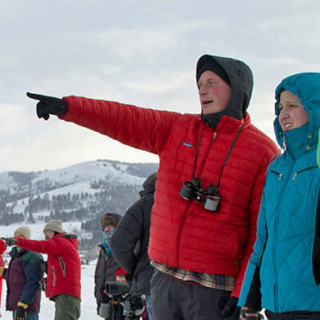Student Spotlight: Nirvan Rouzbeh

In Episode 65 of Confluence, Nirvan Rouzbeh, a graduate student in the Neuroscience program, shares about his journey to UM and his research on glutamate receptors.
Story Transcript
Let's say you go to a store and buy a chair or a table or something, and it comes with a manual, right? How to put it together, how it works and, but the human brain—we don't have the manual that’s—so you don't know how things work, and you’re kind of—we're in the process of reverse engineering things to see how are things, why are, you know, how do things work and yeah, that’s all just very interesting to me.
I'm Nirvan Rouzbeh, and I'm in the Neuroscience graduate program at the University of Montana. And I study NMDA receptors.
So, I'm from Iran. I came here about 11, 12 years ago and my dad was a neurosurgeon, and he passed on a pair of steady hands and a curiosity for the brain to me. In my undergraduate studies, I was trying to understand the software of the brain, kind of, you know, behavior and whatnot. And I came to the University of Montana to study the hardware—the stuff under the hood to see, you know, how things happen on a cellular molecular level.
So, what I study is a family of glutamate receptors. So, glutamate is one of these neurotransmitters in the brain. So, these family of glutamate receptors that I study are called the NMDA receptors. These NMDA receptors are responsible for any sort of learning that happens. So, any time in your life that you've ever learned anything, it's thanks to these NMDA receptors.
So, these NMDA receptors are put together with four subunits. But basically, it’s like Power Rangers. Different combinations come together, and they form this massive channel. If you have over-activation of these receptors, it’s a bad thing. You could get a seizure or epilepsy. And if they’re not activated enough, if you get hypo activity of these NMDA receptors, different things happen. If you don’t get enough stimulation, then a slew of different disorders could happen. You could hallucinate or other things could happen. And they're involved in so many different things and there's so much to learn about these receptors. And specifically, with the subunit that I'm studying, there has been diseased implications in autism spectrum disorders, schizophrenia, Huntington's disease among other neurodegenerative disorders, which is why it's so important for us to learn about these and find those, you know, specific pharmacological compounds so we can isolate the response and study them.
My primary advisor is Kasper Hansen. Kasper has been very helpful in, you know, the— my development as a scientist and basically helping me with my research, and he's kind of the go-to guy for this field because he's been in it for a while. What I like about the neuroscience graduate program as a whole is that we have a lot of diversity in terms of the type of research that people do. And, you know, we're constantly growing with new people joining our department. It's very nice to, kind of, be in touch or basically have access to all these resources and be in touch with all these different people. And, you know, it's, it's a tight-knit community. It's just a nice environment.
